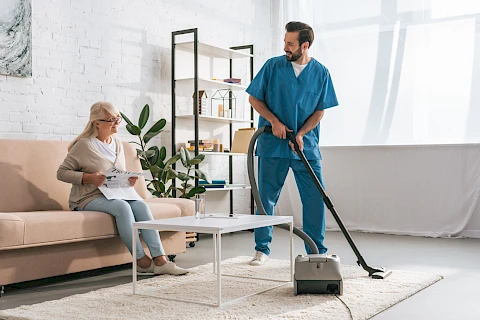
Caregivers play a significant role in helping seniors manage seasonal allergies during the fall months. Allergies can significantly impact seniors' health and well-being, making effective management critical. Senior Helpers Columbus North, OH, shares common allergy symptoms in seniors, strategies for minimizing exposure to allergens, and tips for working with healthcare providers to develop an effective management plan.
Common Allergy Symptoms in Seniors
Seasonal allergies can manifest in several ways. Here are some common symptoms to look out for:
- Sneezing and Runny Nose: These symptoms are prevalent and can be quite bothersome.
- Itchy or Watery Eyes: Allergens often cause eye irritation, leading to discomfort.
- Coughing and Wheezing: Allergies can trigger coughing fits and breathing difficulties.
- Fatigue and Headaches: Persistent exposure to allergens can lead to tiredness and headaches.
- Skin Rashes or Hives: Allergic reactions may cause skin irritations or hives.
If you notice these symptoms in the seniors you care for, it's essential to take steps to minimize their exposure to allergens and seek medical advice if necessary.
Strategies for Minimizing Allergen Exposure
Minimizing exposure to allergens can significantly reduce the severity of symptoms.
Create a Healthy Environment
To create a more comfortable environment, consider keeping windows and doors closed to prevent outdoor allergens from entering the home. Using air purifiers and changing filters regularly can help remove allergens from the air. Remember to maintain a clean living environment by regularly dusting, vacuuming, and cleaning to reduce the presence of allergens such as pollen, pet dander, and dust mites.
Avoid the Outdoors on High-Pollen Days
You must also be mindful of outdoor activities. Pollen counts are typically highest in the early morning and late afternoon, so plan outdoor activities when pollen levels are lower. After being outside, encourage seniors to shower and change clothes to remove allergens that may have attached to clothing and skin, reducing indoor contamination.
By implementing these strategies, you can create a healthier environment and reduce the impact of seasonal allergies on the seniors in your care.
Tips for Working With Healthcare Providers
Collaborating with healthcare providers is necessary for managing seniors' seasonal allergies effectively.
Have Regular Check-Ups
Regular check-ups can help monitor the severity of allergies and adjust treatment plans as needed. During these visits, openly discuss the symptoms and any suspected triggers with the healthcare provider. This information can guide the development of an effective management plan.
Get Allergy Tests
Consider exploring allergy testing options, as these tests can identify specific allergens causing symptoms. Knowing the exact triggers allows for more tailored treatment. Discuss medication options with the healthcare provider, such as antihistamines, decongestants, and nasal sprays, to alleviate allergy symptoms.
Develop a Personalized Allergy Management Plan
Work together to develop a personalized allergy management plan that addresses the senior's specific needs. This plan might include avoiding certain triggers, taking prescribed medications, and implementing lifestyle changes. Being proactive in working with healthcare providers ensures seniors receive the best possible care for their allergies.
Get Professional Assistance From Senior Helpers Columbus North, OH
Managing seasonal allergies in seniors is vital for maintaining their health and well-being. Recognizing common symptoms, minimizing exposure to allergens, and working closely with healthcare providers can make a significant difference. Encourage seniors to take proactive steps for allergy management and seek professional assistance when needed.
For professional assistance in managing seniors' seasonal allergies in Westerville, Powell, Hilliard, Delaware, and Dublin, contact us at Senior Helpers Columbus North, OH. Together, we can create a healthier and more comfortable environment for the seniors we care about.